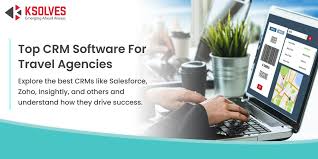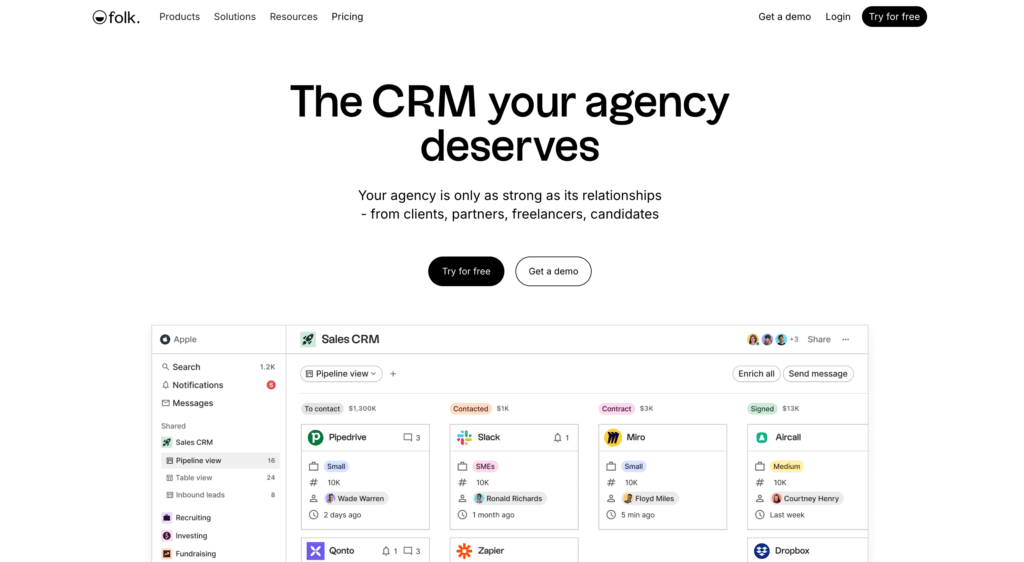Introduction
In the digital age, agencies—from marketing firms and creative studios to PR consultancies and advertising houses—are facing the constant challenge of managing an expanding portfolio of clients, projects, and communications. Customer Relationship Management (CRM) systems have evolved into essential tools that can help agencies streamline operations, boost productivity, and enhance client satisfaction. In this comprehensive guide, we will explore the features, benefits, and top contenders of the best CRM solutions tailored specifically for agencies in 2025.
1. Understanding the CRM Needs of Agencies
Unlike product-based businesses, agencies primarily deal in services, which creates unique CRM requirements. These include:
- Project-based client interaction
- Multiple stakeholders per client
- Continuous communication and collaboration
- Proposal tracking and contract management
- Performance reporting and analytics
- Invoicing and payment tracking
A robust CRM must accommodate these needs with seamless integrations, automation, and customizability.
2. Key Features to Look for in a CRM for Agencies
A CRM system tailored for agencies should offer a well-rounded suite of features:
- Client Management: Unified profiles with history, contact details, preferences, and contract terms.
- Project Management: Integration of project workflows, task assignments, deadlines, and Gantt charts.
- Sales and Lead Tracking: Tools for pipeline visualization, opportunity scoring, and lead nurturing.
- Communication Tools: Email templates, SMS integrations, in-app calling, and chatbot compatibility.
- Custom Reports and Dashboards: Real-time analytics on KPIs, sales, project progress, and ROI.
- Time Tracking and Billing: Track time spent on client tasks and automatically generate invoices.
- Integrations: Compatibility with tools like Slack, Trello, Asana, QuickBooks, Mailchimp, and Google Workspace.
3. Benefits of Using CRM for Agencies
Implementing a CRM system can transform agency operations:
- Improved Client Relationships: Centralized data enables personalized communication and proactive support.
- Enhanced Productivity: Automated workflows reduce manual effort and ensure consistency.
- Increased Revenue: Better sales pipeline management leads to higher conversion rates.
- Data-Driven Decisions: Analytics provide deep insights into team performance and client satisfaction.
- Collaboration and Transparency: Teams can work together effectively with shared access to tasks and updates.

4. Top CRM Solutions for Agencies in 2025
Let’s review some of the most popular CRM tools that cater specifically to agencies:
a) HubSpot CRM
- Overview: One of the most popular CRMs globally, offering a free version and scalable premium plans.
- Best For: Small to mid-sized agencies looking for marketing automation and lead management.
- Key Features:
- Contact and lead management
- Email and ad campaign automation
- Customizable dashboards
- Seamless integration with CMS, Google Workspace, and Slack
b) Zoho CRM
- Overview: Feature-rich and affordable CRM with a focus on customization and integrations.
- Best For: Agencies seeking a balance between price and flexibility.
- Key Features:
- Workflow automation
- Multichannel communication
- Advanced analytics
- AI-powered sales assistant (Zia)
c) Salesforce for Agencies
- Overview: The industry giant, offering comprehensive CRM solutions with deep customization.
- Best For: Large agencies or firms with complex needs and high budgets.
- Key Features:
- Advanced lead management
- Marketing cloud
- Service automation
- Enterprise-grade analytics and integrations
d) Copper CRM
- Overview: Designed specifically for Google Workspace users, Copper CRM is ideal for teams already using Gmail and Google Docs.
- Best For: Agencies using Google Workspace and preferring minimal onboarding time.
- Key Features:
- Automated data entry
- Pipeline management
- Email tracking
- Custom reporting
e) Agile CRM
- Overview: A budget-friendly tool with strong marketing and service automation capabilities.
- Best For: Startups and small agencies.
- Key Features:
- Contact and project management
- Landing page builder
- Helpdesk and ticketing
- Social media integration
5. Case Studies: CRM Success in Agencies
Case Study 1: Creative Storm Marketing
Before adopting a CRM, Creative Storm relied on spreadsheets and manual follow-ups. After integrating HubSpot CRM:
- Client follow-up time dropped by 35%
- New leads increased by 50% via automated campaigns
- Cross-functional collaboration improved with shared access to campaign performance metrics
Case Study 2: Zenith PR Consultants
Zenith PR used Zoho CRM to manage complex client portfolios across industries. Key outcomes included:
- 3x faster proposal approvals
- 70% reduction in missed deadlines via automated reminders
- Enhanced customer satisfaction scores due to timely updates and deliverables
6. Implementation Tips for Agencies
- Define Your Goals: Clearly outline what you aim to achieve—client retention, productivity, or revenue growth.
- Involve Your Team: Let users from sales, marketing, and project management test the CRM.
- Start Small: Implement the CRM with a pilot team before scaling to the entire agency.
- Customize Workflows: Modify the platform to reflect your agency’s terminology, stages, and goals.
- Train and Support: Provide training sessions and ongoing support to ensure smooth adoption.
7. Trends in Agency CRM for 2025
CRM tools are evolving rapidly. Key trends that agencies should watch include:
- AI and Predictive Analytics: CRM systems are leveraging AI to forecast client behavior and optimize outreach.
- No-Code Customization: Agencies can now build their workflows and dashboards without IT involvement.
- Integration with Creative Tools: CRMs are increasingly integrating with Adobe, Canva, and project management platforms.
- Voice and Chatbot Integration: Automated conversations can handle client queries and lead capture.
- Mobile-First CRMs: Agencies working remotely or on-the-go are opting for mobile-optimized platforms.
8. Common Pitfalls to Avoid
- Overcomplicating the Setup: Don’t overload the system with features your team doesn’t need.
- Ignoring User Feedback: Continuously solicit input from your team to improve CRM usage.
- Not Updating Data: Outdated or incorrect data can harm client relationships.
- Skipping Training: Ensure everyone knows how to use the platform effectively.
- Failing to Track ROI: Measure performance to ensure your CRM investment delivers results.
Conclusion
Choosing the best CRM for your agency can be a game-changer. Whether your focus is on better lead conversion, improved communication, or streamlined operations, the right CRM system offers tools to empower your team and delight your clients. With so many options on the market in 2025, agencies must prioritize flexibility, integrations, and ease of use. Start with your goals, assess your budget, test thoroughly, and let your CRM be the foundation for sustainable growth.
